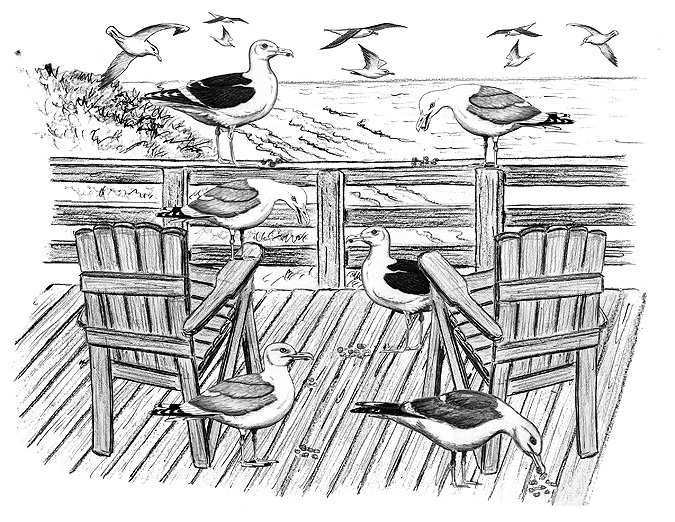
Dear Bird Folks,
I’ve recently become interested in birds, partly from reading the mix of fun and facts in your weekly column. I also get a kick out of the seagulls I see every morning in front of my house. Each day I toss out a few scraps (usually dog food) onto the beach and the seagulls quickly devour all of it. However, when I put food on my back porch, which overlooks the beach, the seagulls ignore it. Why won’t they eat from my porch? Also, should I even be feeding seagulls in the first place?
– Noel, Eastham, MA
Thanks, Noel,
You are obviously a brilliant man with discerning taste. I’m flattered that you like my column. However, after reading my answers to your questions you might not feel the same, or maybe you will. Let’s see how it goes. It’s awesome that you have become interested in birds, but as a new birder you need to strike the word “seagull” from your vocabulary. Saying seagull might be okay for non-birders or people who don’t know any better, but gulls can be found just about anywhere, including thousands of miles away from the nearest ocean. Thus, the word “sea” doesn’t really fit. The name seagull is really a misnomer, much like koala bears, which aren’t really bears, Saint Bernards, which aren’t saints, and white chocolate, which is just gross.
On any given day we can see as many as a dozen different species of gulls here on the Cape. In the winter Herring Gulls, Great Black-blacked Gulls and Ring-billed Gulls are the most common and are the gulls that are most likely to be attracted to human food (or in your case, dog food). Gulls are fearless and will grab food wherever they find it. Like you, I find it strange that gulls won’t eat off your porch. Hmm. Have you tried bringing your dog in the house? Just a thought. In 1993, when I first moved into my present home, we would often eat dinner on the back deck. One evening a Herring Gull landed on the railing and began eyeballing our food. At first, we all thought it was charming. Well, everyone except for little Casey, who was only two years old at the time. He totally freaked out and ran inside, acting as if Godzilla had just descended on the neighborhood. As the rest of us sat there laughing, the gull proceeded to help itself. With lightning-quick strikes, the bird grabbed a beak-full of our supper and was gone in a flash. Just about everybody’s plate had been raided. (Although the gull didn’t touch my tofu. There are some things even gulls won’t eat.)
This brings us to your next question: Should you even be feeding gulls in the first place? This might sound strange coming from someone who makes a living selling bird food, but I vote no on this one. Gulls are big, can be aggressive and shouldn’t be encouraged to habituate to people. The bird that ransacked our dinner plates most likely had been fed by the previous homeowners. And while none of us were upset by the thieving gull (except Casey, who didn’t leave the house for the next five years), the bird clearly had learned some bad habits. This also could be a problem for the gull itself. What if it tried to steal food from a hot grill? Gulls don’t know what “Hibachi” means. (Even I don’t know what it means.)
Here’s another example of gulls being attracted to something that’s not in their (or our) best interest. A few winters ago I went to look for loons in Provincetown’s Herring Cove. The minute I pulled into the parking lot an enormous flock of gulls descended on my car. Some of the gulls landed directly in front of me, but most hovered above or alongside my car and stared into my windows. I felt like a celebrity who was being hounded by the paparazzi (which, of course, I’m used to). As I left Herring Cove (and headed to the nearest carwash), I wondered why the gulls had singled me out and didn’t bother anyone else. A few weeks later I discovered the answer. It seems Napi, the owner of the delicious restaurant of the same name, regularly drove to Herring Cove to feed gulls leftovers. And, as you may have guessed by now, Napi’s car was the same color, make and model as mine. The gulls thought I was Napi with more grub. (The next time I went to Herring Cove, I used my wife’s car.)
If my two stories about feeding gulls didn’t impress you, maybe this one will. In a recent story reported by the BBC, Emily, who lives on the coast of England, found out the hard way that gulls can be potential problems. Last July, Emily let her Yorkshire terrier (Roo) out in the yard to play (or to, well, you know). This is when a mother Herring Gull, which was nesting nearby, spotted Roo and went after him. I’m not going to get into the details of what happened next, but Emily is now in the market for a new dog (maybe a Saint Bernard this time). And while I usually take the side of the birds in such cases, it’s still sad when someone loses a pet, even if it’s a Yorkshire terrier.
Sorry I couldn’t back you up on this one, Noel, but my advice is to stop putting out dog food and let the gulls find food on their own. If you want to feed birds, feed chickadees. They don’t bother anybody. And only feed them birdseed. I don’t ever recommend feeding birds dog food…at least until the day comes when I start selling dog food, then I might change my mind.